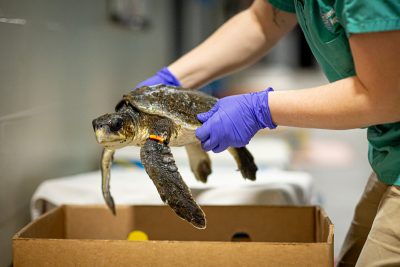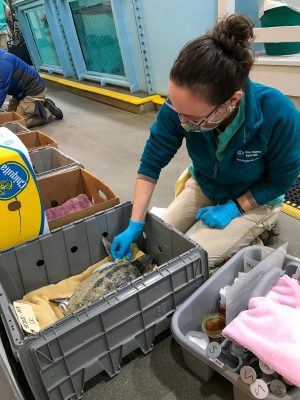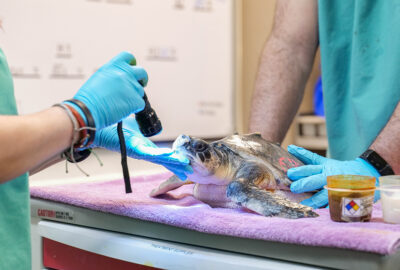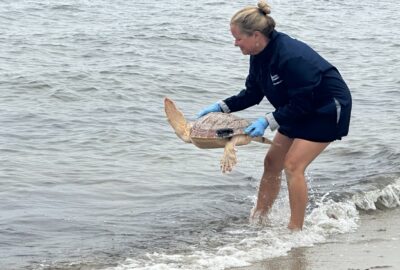Cold-Stunned Sea Turtle Frequently Asked Questions
By New England Aquarium on Friday, November 22, 2024


Each year, the New England Aquarium partners with a number of organizations to rescue and rehabilitate hundreds of cold-stunned sea turtles with the goal of returning them to the wild. Learn more about how turtles get stranded, what it means to be cold-stunned, and how and why these turtles are rescued.
When are there sea turtles in Massachusetts?
Every summer, several species of sea turtles (including green, loggerhead, and Kemp’s ridley) enter Cape Cod Bay as they begin to inhabit coastal New England waters. During this time, the Bay offers ideal foraging and temperatures for these turtles. As fall approaches and water temperatures drop, sea turtles will start their migration back to warmer waters.
What is cold stunning, and why does it happen here?
Since turtles and other reptiles are ectothermic (cold-blooded), they rely on their surroundings to regulate their internal temperature. When air and water temperatures drop, so does their body temperature. When a turtle’s body temperature drops too low, it becomes cold-stunned, a type of reptilian hypothermia. This means its metabolism slows down, and it loses the ability to feed or swim.
This condition occurs frequently on the bay side of Cape Cod when migrating sea turtles are not able to move out of our cold waters in the fall. Sea turtles that use their innate navigation instincts will swim south to try to reach warmer waters, not realizing they need to navigate around the geographical “hook” shape of Cape Cod. Trapped in the cooling water of Cape Cod Bay, these turtles become cold-stunned and wash up on the area’s beaches. They suffer from a variety of problems, including pneumonia, hypothermia, dehydration, malnutrition, and frostbite. Occasionally, a turtle is found that also has damage from boat strikes, entanglement in fishing gear, or ingestion of plastic.
How are they rescued?
The New England Aquarium and Mass Audubon Wellfleet Bay Wildlife Sanctuary have a longstanding relationship when it comes to sea turtle rescue. Every year, Mass Audubon staff and volunteers patrol Cape Cod beaches during turtle stranding season, which typically lasts from late October into December, with the peak beginning in mid-November. Surviving turtles are brought to the Aquarium’s Sea Turtle Hospital at our Animal Care Center in Quincy, MA, the primary triage facility for cold-stunned turtles in New England.
How common is cold stunning?
As of 2023, our five-year average of total turtles admitted to our Animal Care Center is 446. In the Northeast, cold stunning is particularly common among Kemp’s ridley turtles, a critically endangered species. Our staff is seeing more stranded cold-stunned turtles each year as climate change warms ocean waters, expanding turtles’ range farther north in the summer and making it less likely they’ll be able to reach southern waters in time for fall. Scientists predict we may see thousands of Kemp’s ridley turtles cold-stunned annually by 2031.
How do we rehabilitate the turtles in our care?

Over the first few days, the turtles are slowly warmed up to normal temperature around 75 °F. Rescue biologists monitor each turtle’s swimming ability and activity level daily until they are comfortably navigating the recovery pools. Once turtles are in the recovery pools for at least 24 hours, we start offering small amounts of food to help them combat weight loss and regain strength. Food is also used to hide medications that would otherwise possibly require injections. Based on bloodwork and radiograph imaging, our Animal Care staff creates individualized treatment plans consisting of fluid therapy and antibiotics. Some turtles may need further diagnostics, such as surgery or additional imaging like CT scans.
Why do we do it?
Ultimately, the goal is to successfully rehabilitate and release these turtles back into warm waters. Every turtle that is rescued and released has the potential to reproduce and make a positive impact on its population, and sea turtles are crucial to the health of the ocean.
All but one of the six sea turtle species has an IUCN Red List status. Statuses range from vulnerable to critically endangered. The sixth species, the flatback sea turtle, is considered data deficient; there is not enough known about the population status to make a classification. Not only is helping stranded sea turtles a valuable part of protecting them, caring for the turtles and releasing them is also a great way to learn a lot about where they travel throughout the year! The Rescue and Rehabilitation team partners with scientists from our Anderson Cabot Center for Ocean Life to implement tracking tags so we can monitor released turtles’ progress and continue to learn more about the species.
What should I do if I see a stranded turtle?
Sea turtles in our region do not typically come ashore unless they are seriously debilitated. Do not attempt to warm them yourself, as warming too quickly could shock them. For sea turtles found on beaches from Boston north through New Hampshire, call the New England Aquarium’s 24-hour Sea Turtle Rescue Hotline at 617-973-5247. Please try to remain calm and leave your name and a phone number where you can be reached. For sea turtles found along the South Shore, Cape Cod, and the Islands, please call the Wellfleet Bay Wildlife Sanctuary at 508-349-2615 x6104. Learn more about how you can help.





